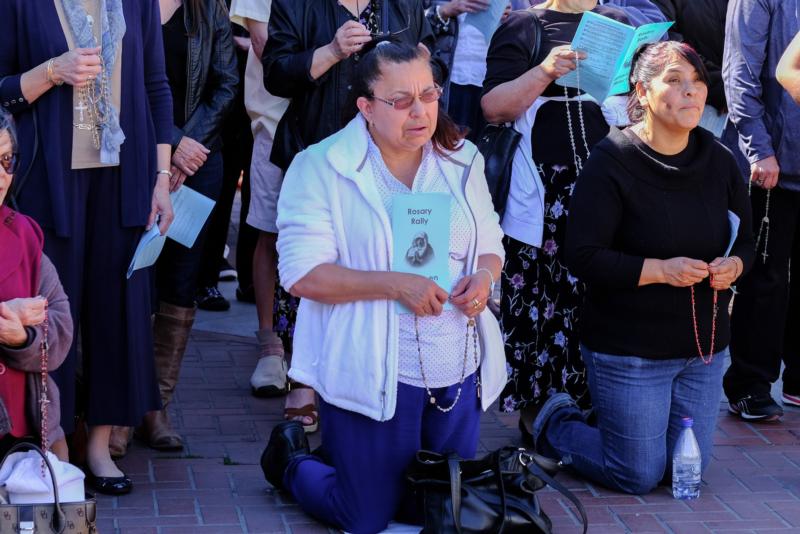
People pray the rosary during a eucharistic procession and rally in San Francisco. Prayer reveals our trust in God and our love for our neighbors, Pope Francis writes in “Gaudete et Exsultate” (“Rejoice and Be Glad”), his new apostolic exhortation. (CNS photo/Dennis Callahan, Catholic San Francisco) See STORIES May 3, 2018.
In his newest apostolic exhortation, “Gaudete et Exsultate” (“Rejoice and Be Glad”), Pope Francis offers a road map for simple ways that everyday people can be holy. While few of us are in a position where we risk dying for our faith, it doesn’t mean our own efforts are in vain.
Pope Francis calls it our “daily perseverance,” but how we respond to people living on the margins, how we treat not only our loved ones but those we don’t particularly like and how we share our faith with others all reflect our attempts to live life like Christ.
Being holy is not the kind of thing we check off our daily to-do list. Rather, it’s how we embrace routines and situations to draw us closer to God and our fellow man.
As long as Margaret Finnerin has been a mother, she has been praying for her children. The mother of four and grandmother of nine prays to Mary Undoer of Knots each morning, taking the time to call each out by name. She does the same when praying the rosary as a way to set her intentions.
“It’s something I do quickly to keep their names in my mind,” said Finnerin, a retired teacher from Denton, Maryland. “I say each individually and I just pray that Mary undoes whatever knots they have in their lives.”
In “Gaudete et Exsultate,” Pope Francis says prayer reveals our trust in God and our love for our neighbors. Through prayer, “we are able to embrace their lives, their deepest troubles and their loftiest dreams,” he writes.
When Jessica DiCicco goes for a run, it’s for more than the endorphin rush. She takes the cares and concerns of the world with her.
DiCicco, 27, of Milford, Delaware, is the founder of the Esther Running Club, named for the Old Testament queen. DiCicco is currently in the middle of a 40-day run streak, with each run dedicated to a special intention, such as single mothers, unity between faiths and married couples.
“This time has allowed me to feel like I’m actively building up the kingdom without leaving my home,” said DiCicco, who aims to use running as prayer and sacrifice. “I’ve always struggled during the seasons of my life when the Lord is not calling me out into the field, but God showed me that I can still make a difference in the world and serve him even if I’m just running around my development.”
Pope Francis writes that forging one’s own path — in DiCicco’s case, both physically and spiritually — moves believers closer to holiness because “they bring out the very best of themselves, the most personal gifts that God has placed in their hearts.”
And when we can see what is in our hearts and also those of others, we can find God anywhere.
Robert Sheehan works in a homeless shelter that welcomes more than 100 men nightly in Council Bluffs, Iowa. Each day, he meets men who suffered a loss that began a spiral of negative events. He doesn’t judge. He doesn’t shame.
“Each day I only have to open my heart and suspend any judgement I carry about myself and homelessness and love each man the best I am able,” Sheehan said. “When a harsh, self-judging man can feel your acceptance, then their life can change and everyone can find themselves in a new place if they accept help and can trust that help.”
We’ve been told “don’t sweat the small stuff,” but it’s actually through our own day-to-day struggles and successes that we expose our holiness. We need not proclaim our acts on a billboard for all to see. God knows, and it is through him that these simple works of holiness cascade.
“Very often it is a holiness found in our next-door neighbors, those who, living in our midst, reflect God’s presence,” Pope Francis writes. “We might call them ‘the middle class of holiness.'”
***
Bothum is a freelance writer and a mother of three.
PREVIOUS: Wife sick at heart that priest didn’t visit her dying husband
NEXT: More than poetry, the beatitudes challenge us to be holy


Share this story